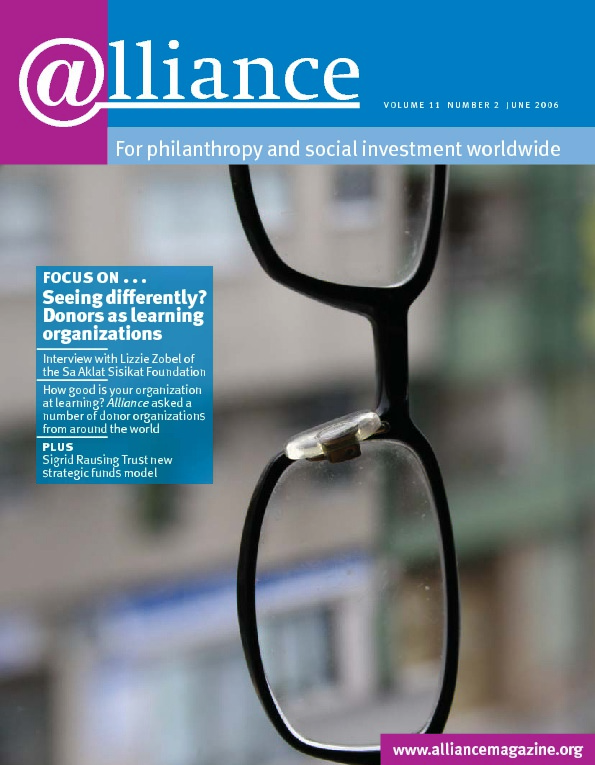At the risk of being contradicted by other articles on this issue’s theme, I want to highlight one critically important way that donors are not learning – from the intended beneficiaries of the work that they support.
I base my views on a recent Keystone survey on the ways civil society organizations and donors learn from and account to the intended beneficiaries of their work.[1] The survey of 155 donors shows a marked discrepancy between donors’ appreciation of the value of accountability to – and learning from – beneficiaries and their practices.
On the appreciation side:
- 90 per cent of donors felt that it was ‘essential’ or ‘important’ to have the views of beneficiaries in understanding grantee performance.
- 83 per cent agreed with the statement that ‘more readily available information from the ultimate beneficiaries’ perspective would help [me] make better strategic grant decisions’.
- 94 per cent felt that it would be ‘extremely valuable’ or ‘valuable’ to receive reports from grantees that offer quality feedback from beneficiaries about the work of their grantees.
But when it comes to walking the talk:
- 17 per cent routinely require grantees to report on beneficiaries’ views on day-to-day performance, and only 20 per cent routinely require grantees to report on beneficiaries’ views of their contributions to long-term development impact.
- 14 per cent routinely provide grantees with resources to develop the capabilities required to elicit honest beneficiary feedback. (By way of contrast, 6 per cent of civil society organizations indicated that they routinely receive donor support for this. With a few exceptions of this type, the civil society organization version of the survey tended to be in line with the donor version.)
- 23 per cent routinely discuss beneficiary feedback with grantees.
The open comments on the survey suggest some possible explanations for the disparity. One theme that emerged is expressed clearly in this quote:
‘While we are keenly interested in understanding the decision-making and motivations of intended beneficiaries in all of our work, this doesn’t necessarily mean that our grantees (or their sub-grantees) need to be directly accountable to the beneficiaries. Rather, they always need to be accountable to demonstrate real impact against the social objectives they are trying to meet. In some cases, the best way to do this would be direct accountability to beneficiaries; in other cases, direct accountability to other stakeholders may serve as a more effective and efficient means of operating (presuming, of course, that the views of the beneficiaries are being effectively gathered and presented to the other stakeholders).’
It bears noting that it is a fairly straightforward exercise to specify those situations where direct beneficiary feedback can be most useful.
One grantmaker broached another theme:
‘My approach is based on supporting good leadership. I proceed on the basis that really good leaders will always be consulting with their beneficiaries and working in partnership with them. Unless they do so, they will not succeed. If there were cheap and effective methods of getting feedback from beneficiaries, I am certain that this would be valuable but as a rule I am quite happy to rely on the reports of the charities that I support … I am very interested in methods of determining the effectiveness of charities and the impact that they make. The views of beneficiaries are obviously critical in determining effectiveness and impact. On the other hand, I am not keen to see large sums of money spent on measuring impact by directly seeking the views of individual beneficiaries and, as a rule, I am willing to take the risk of being misled by the charities which I support.’
But perhaps the most commonly shared open comment reflected a sense that this was an area that needed fresh attention. When provided with a list of possible new services to address the gap, every suggestion garnered ‘interest’ or ‘high interest’ at over 80 per cent.
Overall, the survey gives me some encouragement that we have an opportunity to close the gap between the rhetoric and the reality around donor learning over the months and years ahead.
1 The surveys are open for one more week from the time of writing, so the findings may change slightly. The final report can be found at http://www.keystonereporting.org
David Bonbright is Chief Executive of Keystone. Email david@keystonereporting.org





Comments (0)